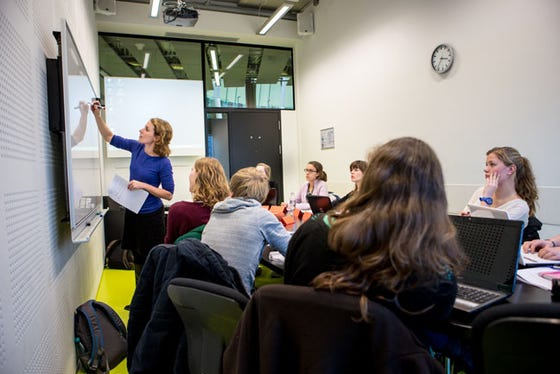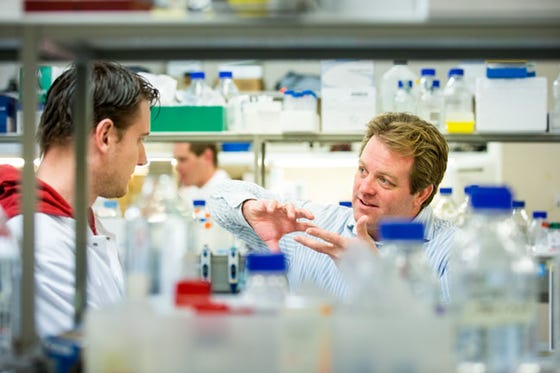Socially responsible innovation
Socially responsible innovation
Medical ethics
The fields of science and technology, and ethics and society, have become inextricably interwoven, says Bredenoord. “Science cannot ignore ethical issues. Especially since society funds a significant part of the research.” For the RMSC program, there are three primary areas where ethical aspects play a role: in the lab, in the clinic (clinical trials) and in society.
Awareness in the labuitklapper, klik om te openen
According to Bredenoord, awareness is key: “Despite the many questions, it’s crucial that researchers are aware of ethical issues and constantly make conscientious choices and considerations. Our parallel ethical research charts these issues together with scientists. Based on experience and literature research, we attempt to create agreement and guidelines with all those involved. This can occur at the institutional level, or more broadly through legislation. Then there will be concrete guides.”

In the lab: research materialuitklapper, klik om te openen
There are ethical questions during all aspects of the research process. It is our responsibility, as investigators, to monitor our projects with an appropriate moral compass. Take biobanks as an example. Questions we consider on a daily basis include where human research material (cells and tissues) originates. In many instances it is residual material or donations. The origin of source material is also an ethical question: what type of material is stored in biobanks? Are donors aware of it and who to they belong to? Has permission been granted for their use? What are the guidelines concerning materials from minors? Other aspects may include reporting of results. Does the researcher have a duty to warn the individual concerned if something is discovered incidentally during the investigation? For example, if a general assay reveals that someone carries a breast cancer gene? Does the researcher then have a moral obligation to report this to the owner of the material? Can the owner stipulate this? Approval and other topics relevant to setting up and managing biobanks are undergoing rapid evolution.
Risk versus benefit of a clinical trialuitklapper, klik om te openen
Once we’ve made a decision to conduct a clinical trial, choosing the appropriate patient group is also done carefully. Should the trial involve patients who can no longer be treated (terminal) or should it involve healthy patients? “In the case of regenerative medicine, by definition, these are new interventions. Trials are also not restricted to testing medicines. Right now we are working on guidelines for clinical trials for regenerative medicine interventions which can support researchers and ethics committees.”
Clinical trialsuitklapper, klik om te openen
Our ultimate goal is developing research findings into patient treatments. Clinical trials, too, employ a range of ethical questions to consider. Bredenoord: “This is particularly so because regenerative medicine and stem cell research often involves new technologies. The core issue is: when do you know enough to take the step of involving patients? As long as a therapy has not been tested definitively on people, evidentiary material is lacking. But this step needs to be ethically defensible.”
Societal perspective in the labuitklapper, klik om te openen
Some developments in regenerative medicine attract considerable social attention. Expectations are often high. Bredenoord believes this societal context critically underlines the importance of tracking the entire trajectory, from lab to patient. As an example, the current topic of gene editing provokes highly charged questions, such as: should we allow the alteration of human DNA to heal genetic diseases? How does changing embryos affect development? What does a new treatment cost and who will have access to it? “It’s essential to connect society with the lab through a multidisciplinary approach, and by letting those involved have a say right at the beginning. Another example is the development of organoids, mini-organs grown from stem cells, which may ultimately be transplanted to treat liver disease. When setting up such clinical trials we advise researchers to discuss their ideas and findings with patients associations.”

Innovation cycleuitklapper, klik om te openen
Medical ethics is a complex subject: how can we work ethically if we still don’t know everything? “Although not too many regenerative treatments have reached the clinic, we must continue to pose and answer ethical issues,” emphasizes Bredenoord “This is how we can create relevant guidelines and governance. It’s the basis of constantly involving the right considerations during the research process. In practice this also means routine evaluation of guidelines or legislation. I view this as an ongoing process and as an integral part of the innovation cycle for new treatments.”

